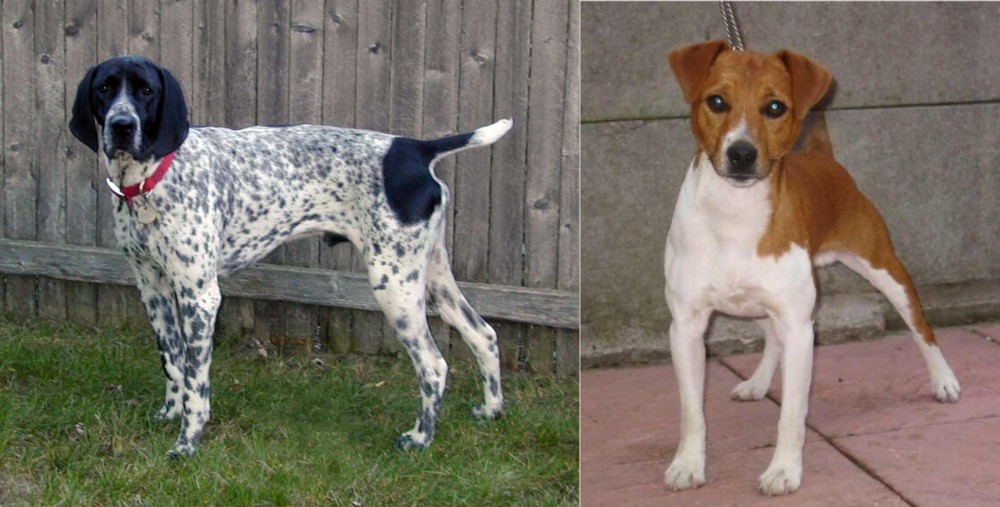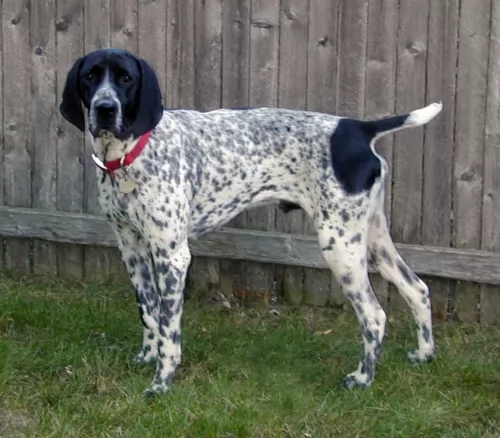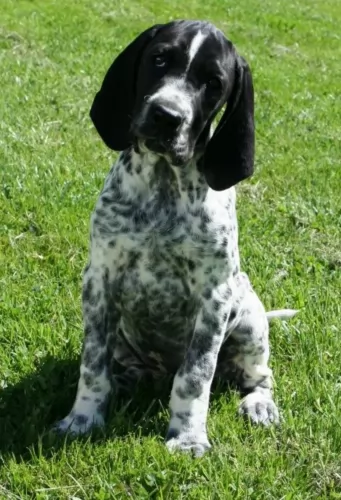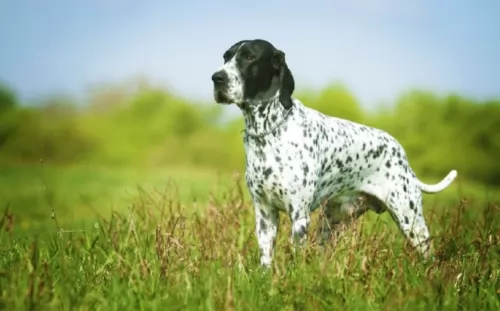 Petzlover
Petzlover Braque d'Auvergne is originated from France but Plummer Terrier is originated from United Kingdom. Braque d'Auvergne may grow 29 cm / 12 inches higher than Plummer Terrier. Braque d'Auvergne may weigh 54 kg / 120 pounds more than Plummer Terrier. Both Braque d'Auvergne and Plummer Terrier has same life span. Braque d'Auvergne may have more litter size than Plummer Terrier. Both Braque d'Auvergne and Plummer Terrier requires Low Maintenance.
Braque d'Auvergne is originated from France but Plummer Terrier is originated from United Kingdom. Braque d'Auvergne may grow 29 cm / 12 inches higher than Plummer Terrier. Braque d'Auvergne may weigh 54 kg / 120 pounds more than Plummer Terrier. Both Braque d'Auvergne and Plummer Terrier has same life span. Braque d'Auvergne may have more litter size than Plummer Terrier. Both Braque d'Auvergne and Plummer Terrier requires Low Maintenance.
 Sometime over 5 centuries ago, in the Cantal Region of France, was born a hunting breed, that might be the real ancestor of today’s pointing hunter dogs. Perhaps the oldest of all pointing gun dog is the Braque d’Auvergne. This breed comes from Central France in the region of Auvergne. This breed was developed prior to written dog breeding records in order to hunt in this region and find, point, flush out and retrieve fowl. This breed is clearly one of if not the oldest breeds in the French Braque. There is no agreement among historians on what breed is the oldest of the European pointing dogs and where they were developed – was it Spain or was it France? It is thought that the Braque Francais Gascogne is the original one of these in the early 1600’s while the Braque d’Auvergne came soon after. Due to the different hunting needs in the different parts of France, the Braque Francais Gascogne was crossed with a lot of other local scent hounds. The Braque d’Auvergne is one of the very oldest of all of these. There are records of the breeds existence in the 1700’s. It is probable that the Braque d’Auvergne was developed by crossing local dogs with Gascogne as well as with the Petit Bleu de Gascogne and the Grand Bleu de Gascogne.
Sometime over 5 centuries ago, in the Cantal Region of France, was born a hunting breed, that might be the real ancestor of today’s pointing hunter dogs. Perhaps the oldest of all pointing gun dog is the Braque d’Auvergne. This breed comes from Central France in the region of Auvergne. This breed was developed prior to written dog breeding records in order to hunt in this region and find, point, flush out and retrieve fowl. This breed is clearly one of if not the oldest breeds in the French Braque. There is no agreement among historians on what breed is the oldest of the European pointing dogs and where they were developed – was it Spain or was it France? It is thought that the Braque Francais Gascogne is the original one of these in the early 1600’s while the Braque d’Auvergne came soon after. Due to the different hunting needs in the different parts of France, the Braque Francais Gascogne was crossed with a lot of other local scent hounds. The Braque d’Auvergne is one of the very oldest of all of these. There are records of the breeds existence in the 1700’s. It is probable that the Braque d’Auvergne was developed by crossing local dogs with Gascogne as well as with the Petit Bleu de Gascogne and the Grand Bleu de Gascogne.
In all of Western Europe, the region of Auvergne is not very populated and has unique geography in that is hilly and has many extinct and eroded volcanoes. A lot of the region is still unpopulated. In this environment, wildlife has flourished, and hunting is successful in providing food for the regions people. This circumstance with an abundance of birds, led to the breeding of the Braque Auvergne to specialize in hunting in this area. The breed is not very popular outside of Auvergne and probably never was. That fact allowed them to be devastated by the Second World War. The Reunion des Amateurs de Braque d’Auvergne (RABA) was started to promote the pure breeding and the protection of the d’Auvergnes. But when Auvergnes was occupied during the war, the slowed breeding of the Braque d ‘ Auvergne almost eliminated the breed. There might have only been about 25 dogs left following the end of the war. These remaining dogs were used to revive the breed, but it is still uncommon, but not rare. Individuals have been imported by other countries including North America. The United Kennel Club (UKC) accepted the breed in 2006 but is not accepted by the AKC (American Kennel Club). The breed is still a working breed and outside of France, very rare.
 This purebred dog was developed by Dr David Brian Plummer in the UK. The whole idea for developing the dog was for it to be an all-purpose dog that could also hunt down vermin.
This purebred dog was developed by Dr David Brian Plummer in the UK. The whole idea for developing the dog was for it to be an all-purpose dog that could also hunt down vermin.
Developed in the 1960s, the Plummer Terrier combines Jack Russell Terrier, Beagle, and red Fell Terrier blood. Later on, a Bull Terrier was brought in too. This created some problems and certain characteristics were selectively bred out of the Plummer.
Today, as a working terrier, the dog is versatile and has many uses. He may not be recognized by any major organizations, but there is at least a well-established Plummer Terrier club in the UK.
 The Braque d’Auvergne is a well built, strong hunting dog with long ears, a large head and a docked tail. His coat is white with black markings and black ears and head. The breed looks a lot like all the other pointing dogs from France. They are medium in stature and has the appearance of a working gundog. He is athletic, muscular and fit. Docking the tail is outlawed in many countries and all of the United Kingdom. In that case the tail is high on the rump and always straight. Their face and head are big for the size of the body and shaped like an oval. With a long muzzle, deep set eyes and a gentle expression, they are kindly and handsome dogs. Their skin is loose but not droopy or wrinkled like hound dogs.
The Braque d’Auvergne is a well built, strong hunting dog with long ears, a large head and a docked tail. His coat is white with black markings and black ears and head. The breed looks a lot like all the other pointing dogs from France. They are medium in stature and has the appearance of a working gundog. He is athletic, muscular and fit. Docking the tail is outlawed in many countries and all of the United Kingdom. In that case the tail is high on the rump and always straight. Their face and head are big for the size of the body and shaped like an oval. With a long muzzle, deep set eyes and a gentle expression, they are kindly and handsome dogs. Their skin is loose but not droopy or wrinkled like hound dogs.
 The Plummer Terrier is a small, working terrier standing at between 28 and 36cm both male and female and weighing between 5 and 8kg.
The Plummer Terrier is a small, working terrier standing at between 28 and 36cm both male and female and weighing between 5 and 8kg.
The ears of the dog are high set and are fairly short, being floppy. The Plummer Terrier has a white and red/orangey coat which is short. He is an average shedder.
The tail would traditionally be docked, giving him an attractive, compact look, but these days the tail tends to be left long. The eyes are almond-shaped, dark brown and alert.
Your Plummer Terrier is active, hardy and adaptable, making it that he can settle down into life in the city or in the countryside. They will however, require regular exercise.
They’re the kind of dogs which are at home inside or outside. They’re very intelligent and can easily be trained and socialized. They’re also loving and loyal towards their human family. He is good with kids too and is playful and energetic around them, giving as good as he gets. His alert, intelligent nature makes him a good watchdog.
 This is a gentle, adaptable and obedient breed. With their intelligence and affectionate nature, they make great family dogs and are eager to please their people. Living with other dogs is fine but not with small, prey size animals. The Braque d’Auvergne should never be left alone pets like gerbils and hamsters. They must be socialized to cats as pets and not prey before living with them successfully. They need to work closely with one human partner. They are first and foremost a hunting dog and need some sort of hunting simulation. They are devoted to their families and want to be constantly in their presence. This can lead to separation anxiety if they are left alone too much. They are great with children and need a family.
This is a gentle, adaptable and obedient breed. With their intelligence and affectionate nature, they make great family dogs and are eager to please their people. Living with other dogs is fine but not with small, prey size animals. The Braque d’Auvergne should never be left alone pets like gerbils and hamsters. They must be socialized to cats as pets and not prey before living with them successfully. They need to work closely with one human partner. They are first and foremost a hunting dog and need some sort of hunting simulation. They are devoted to their families and want to be constantly in their presence. This can lead to separation anxiety if they are left alone too much. They are great with children and need a family.
 Your Plummer Terrier promises to be a great companion and family pet, getting on well with children.
Your Plummer Terrier promises to be a great companion and family pet, getting on well with children.
They’re intelligent too, so they’re easy to train. Being low maintenance and being a healthy breed too, the Plummer Terrier has got everything that people want from a canine friend - love, devotion, action, low maintenance, health and a wonderfully companionable nature.
 The Braque d’Auvergne is a healthy breed but can face some of the same health concerns as other pointers and hunting dogs. The long, droopy ears can get infected easily if wet and need to be cleaned regularly so that food or dirt are not trapped their either. Because of the small gene pool however they may be at risk for several issues. The breeders in France express concerns about possible hip dysplasia and testing is highly recommended. Because they are at risk for other conditions that might not show up until later in life, it is also recommended that they be tested by the Canine Eye Registration Foundation (CERF) as well as the Orthopedic Foundation for Animals (OFA).
The Braque d’Auvergne is a healthy breed but can face some of the same health concerns as other pointers and hunting dogs. The long, droopy ears can get infected easily if wet and need to be cleaned regularly so that food or dirt are not trapped their either. Because of the small gene pool however they may be at risk for several issues. The breeders in France express concerns about possible hip dysplasia and testing is highly recommended. Because they are at risk for other conditions that might not show up until later in life, it is also recommended that they be tested by the Canine Eye Registration Foundation (CERF) as well as the Orthopedic Foundation for Animals (OFA).
 These feisty little dogs are known to be a robust, healthy breed and with good care can reach between 12 and 15 years of age, and maybe older.
These feisty little dogs are known to be a robust, healthy breed and with good care can reach between 12 and 15 years of age, and maybe older.
Some common dog diseases that your Plummer Terrier might succumb too, but which is highly unlikely.
Distemper and parvovirus are two example of these infectious diseases. Parvovirus is deadly and can be picked up through contact with the feces of an infected dog. Your dog will be vomiting, won’t want to eat and will no doubt also have bloody diarrhea.
Distemper is transmitted through contact with an infected dog’s urine or blood. Symptoms include difficulty with breathing, fever and diarrhea. There are vaccines available for the prevention of these life-threatening diseases.
This disease can be debilitating for your pet and can include incontinence and bacterial infections. You’ll find your pet trying to urinate frequently but producing small drops of urine. Don’t hesitate – get your pet to the vet immediately.
You have to be careful with dental disease because many people think it affects just the teeth but it is linked to problems with the heart, kidneys and to diabetes. To prevent dental problems, look inside your dog’s mouth regularly and get him to a vet or professional dog groomer to attend to the tooth.
 The Braque d’Auvergne needs a high-quality diet fit for a working dog but not too much to make him obese. They are an active breed to choose a formula that is designed for working dogs.
The Braque d’Auvergne needs a high-quality diet fit for a working dog but not too much to make him obese. They are an active breed to choose a formula that is designed for working dogs.
Although no studies have been conducted on the Braque d’Auvergne’s health issues there are many conditions that similar breeds are susceptible to and the d’Auvergne might be as well. This includes any of the following:
This is an active, working dog who needs a lot of stimulation and exercise. The only real appropriate exercise for these dogs is hunting or outings in the woods. He not only needs the exercise, but he also needs to stimulate his sense of smell and his gundog intelligence. He might excel in lure chase or even a form or barn hunt. They certainly could excel at obedience trials and perhaps rally. If you are a weekend hunter then this is the ideal dog for you. They are so easy to train that they surpass other pointers for success with casual hunters. They hunt at a slower pace than many other gundogs. Their intelligence and athleticism lend itself well to agility and flyball also. They need a large (+acres)fenced in area to run and play.
 He is an active, energetic little dog and loves nothing more than to be darting after a ball, going for long walks with you or jumping into a pool. He’s happiest when active and busy with his beloved family members.
He is an active, energetic little dog and loves nothing more than to be darting after a ball, going for long walks with you or jumping into a pool. He’s happiest when active and busy with his beloved family members.
With his short coat and being a moderate shedder, you’ll just have to give your Plummer a good brush twice a week to keep the coat free of loose hairs and dust.
Always aim to give your dogs the best food there is. Dogs are just like people when it comes to food – nutritious, quality food helps towards good health and longevity. Apart from a good quality commercially manufactured food, give him some homemade food as a treat too. Simple, tasty food is best appreciated by dogs. They don’t want spicy, exotic foods that can upset their stomachs.
They love boiled chicken, brown rice or pasta and healthy vegetables such as sweet potatoes, carrots and spinach. You can add this into the dry kibble occasionally as a treat, and also some raw meat from time to time. Your pet will be healthy and happy with such a diet. Make sure he always has a bowl of cool, fresh water within reach.